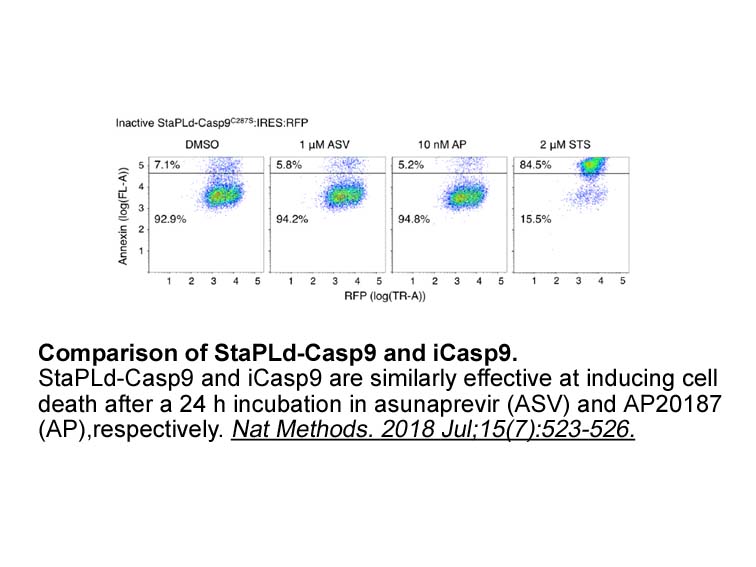Archives
br Conclusions br Acknowledgments We
Conclusions
Acknowledgments
We thank webshop.elsevier.com for the assistance of the language-editing service.
Introduction
Sleep drives metabolite clearance from the adult h2 agonist (Xie et al., 2013) and promotes learning-dependent synapse formation and maintenance of selected dendritic branches, both of which contribute to memory storage (Yang et al., 2014). Sleep deprivation (SD) impairs hippocampal dependent learning and memory process, various mechanism are involved including neuronal excitability, synaptic plasticity, decreased neurogenesis and hippocampal volume (Ju et al., 2014, Kreutzmann et al., 2015). Neuroinflammatory actions were rarely reported in the sleep disorder of sleep deprivation. One sleep deprivation animal experiment provided evidence that LPS can cause central pro-inflammatory cytokines including IL-1β, IL-6 and TNF-α which are associated with neurogenesis inhibition (Monje et al., 2003). Plenty of researches proved that IL-1β is a critical mediator of the antineurogenic caused by acute and chronic stress or sleep deprivation (Mueller et al., 2014, Goshen et al., 2008, Ben Menachem-Zidon et al., 2008, Koo and Duman, 2008). A cohort study with 14 young men found that 5 nights of sleep restriction increased lymphocyte activation and the production of proinflammatory cytokines including IL-1β、IL-6 and IL-17 accompanied by increased heart rate and serum CRP (van Leeuwen et al., 2009). IL-17A, which is also called IL-17, is the signature cytokine mainly secreted by Th17 cells, plays vital role in host defense against extracellular bacterial infection and fungal infection, and contributes to the pathogenesis of various autoimmune (Qian et al., 2010). IL-17A is most homologous to IL-17F. IL-17F has the similar function with IL-17A, but its inflammatory effect is weaker than IL-17A (Dubin and Kolls, 2009). IL-17 receptor A (IL-17RA) and IL-17 receptor C (IL-17RC) complexes mediate cell responses to IL-17A and IL-17F (Toy et al., 2006). A previous study reported that IL-17 plays a role in negative regulation on adult hippocampal neurogenesis under physiological conditions (Liu et al., 2014). However, little is known about the effects of IL-17 on cell proliferation under sleep deprivation conditions.
The family of mitogen-activated protein kinases (MAPKs) is composed of three major groups: the c-jun N-terminal kinases (JNKs), the extracellular regulated kinases (ERKs), and the p38 MAPKs. MAPKs are important mediators of signal transduction from the cell surface to the nucleus and regulate cellular processes such as cell proliferation, differentiation, and apoptosis (Cargnello and Roux, 2011). P38 MAPK as an important member of MAPKs, can be activated by stress, inflammation and so on (Tormos et al., 2013). IL-17 was reported as one of the inflammatory cytokines which activate p38 pathway (Roussel et al., 2010, Chen et al., 2011, Zhu and Qian, 2012). We hypothesize that REM sleep deprivation results in an increase of IL-17 in the CNS which disturbs proliferation of hippocampal neural progenitor cells via P38 MAPK. Therefore, in this study, we aimed to determine the effect of IL-17 on proliferation  of hippocampal neural progenitor cells on acute REM sleep deprivation models focusing on the following: (1) the changes of IL-17, p-p38 and cell proliferation in hippocampus in SD models; (2) Whether hippocampal neural progenitor cells express IL-17RA and IL-17RC; (3) the action of IL-17 of CNS on p38MAPK expression and cell proliferation in cage control group; (4) whether blockade of p38MAPK would mitigate hippocampal cell proliferation restraint caused by IL-17.
of hippocampal neural progenitor cells on acute REM sleep deprivation models focusing on the following: (1) the changes of IL-17, p-p38 and cell proliferation in hippocampus in SD models; (2) Whether hippocampal neural progenitor cells express IL-17RA and IL-17RC; (3) the action of IL-17 of CNS on p38MAPK expression and cell proliferation in cage control group; (4) whether blockade of p38MAPK would mitigate hippocampal cell proliferation restraint caused by IL-17.
Results
Discussion
In the study, we demonstrate that acute REM sleep deprivation suppresses hippocampal cell proliferation, consistent with previous studies (Guzman-Marin et al., 2005, Guzman-Marin et al., 2008, Mueller et al., 2011). IL-17 is increased and p38MAPK is active in acute REM sleep deprivation model. Hippocampal neural progenitor cells expressing IL-17RA and IL-17RC were also found in this study. The i.p. administration of exogenous rIL-17 suppresses hippocampal cell proliferation in the CC group. The antiproliferative effect of sleep deprivation is blocked by p38MAPK inhibition via SB203580. Together the results demonstrate that IL-17 plays a vital role in antiproliferative effect of acute sleep deprivation via  the p38 MAPK signaling pathway.
the p38 MAPK signaling pathway.